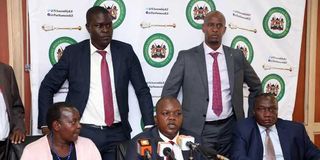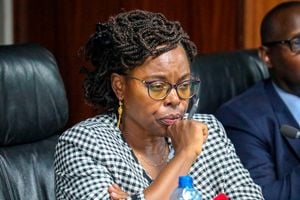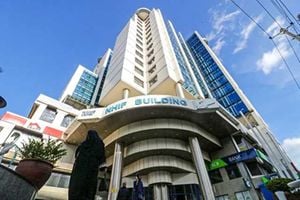
The National Assembly Public Petitions Committee, led by its chairman Nimrod Mbai (centre), addresses journalists on March 7, 2023.
Investigations by the National Assembly into the Sh21 billion siphoned from the National Health Insurance Fund (NHIF) in fictitious payments through Incurred But Not Reported (IBNR) claims have gone quiet.
The investigations arose from a petition filed in the National Assembly by Mr Bernard Muchere – a former internal auditor at the National Treasury – currently a fraud risk assessment consultant. It was received on October 30, 2023.
According to Mr Muchere’s petition, the Sh21 billion was dubiously incurred but not reported by NHIF, which has since transitioned to the Social Health Authority (SHA).
House records show that the petition was conveyed by Speaker Moses Wetang’ula on December 6, 2023 and committed on the same day to the Public Petitions Committee. Little has come out of the committee that is chaired by Kitui East MP Nimrod Mbai.
Though the House Standing Orders demand that such petitions be concluded within 90 days of committal and a report tabled, the Daily Nation has learnt that the team may not produce a report in the near future.
Only the petitioner has been called to prosecute the matter. The other persons of interest are still waiting to be summoned.
“Whenever a petition is committed to the Public Petitions Committee, the committee shall, within 90 calendar days of committal, respond to the petitioner by way of a report addressed to the petitioner or petitioners and laid on the table of the House,” reads Standing Order 227 of the National Assembly.
Reached for a comment, Mr Muchere said the only communication he got from the National Assembly was the one requiring him to appear before the committee.
“I did my part as a citizen to petition Parliament on a matter of public concern. Their work on the matter is cut out. I will be happy to get a report,” Mr Muchere said.
Mr Mbai did not respond to enquiries sent to his known mobile number on why his team has taken long to conclude the investigations and report to the House.
Since Mr Muchere appeared before the committee on September 10, 2024, no other witness has been summoned.
“The committee wants the petitioner to appear before it and give more clarification,” a member of the team who did not want to be quoted, said.
Mr Muchere had requested that the committee summons Ministry of Health officials, the NHIF Board, National Treasury and the Auditor-General.
His appearance before the committee followed the August 27, 2024 letter to him from Mr Jeremiah Ndombi, the Senior Deputy Clerk of the National Assembly.
While committing the petition to the committee, Mr Wetang’ula directed it to speed up the investigations.
“Having established that the matter raised in the petition is well within the authority of this House, I hereby commit the petition to the Public Petitions Committee for consideration,” he said.
“The committee is required to consider the petition and report its findings to the House and to the petitioner in accordance with the standing orders.”
Apart from the Ministry of Health, the petition puts the NHIF Board and Treasury in a tight spot on account that the irregular payments “caused a crisis in the contributors’ medical coverage, resulting in most patients being denied treatment with vital consequences”.
IBNR, Mr Muchere says in the petition, is a type of reserve account used in the insurance industry as the provision for claims or events that have transpired but have not yet been reported to an insurance firm.
“IBNR is used by insurance companies, particularly along the eastern Gulf Coast of the US where hurricanes and other natural disasters are common,” the petition says.
Mr Muchere says upon examining NHIF records, he established that during the preparation of financial statements for the 2021/22 year, the NHIF managers “fraudulently created IBNR claims aggregating to more than Sh21 billion”.
The creation, he says, was backdated to the 2019/20 and previous fiscal years.
“The facts enumerated in the petition provide proof that IBNR claims were deliberately created to siphon NHIF funds,” Mr Muchere says.
“Parliament should establish whether the Health CS approved the claims.”
The petitioner says the unbudgeted claims were then charged to NHIF members’ contributory schemes like health insurance subsidy programmes for orphans and vulnerable children, and the poor, elderly persons and persons with severe disability (HISP- OVCs and OPPSD).
The payments, Mr Muchere notes, include Sh9.7 billion as proceeds from the National Health Scheme, Sh4.01 billion from National Police Service and Kenya Prisons Service, Sh2.9 billion from civil servants scheme, Sh2.3 billion meant for Linda Mama programme and Sh780.7 million from parastatal scheme.
The others are Sh683.92 million from EduAfya scheme, Sh525.3 million from the county scheme, Sh190.2 million retirees’ scheme, Sh31.3 million from HISP-OVCs and Sh6.5 million from HISP- OPPSD.
In 2014, the government, through NHIF, rolled out HISP to cushion the vulnerable through cash transfers under the State Department for Social Protection.
What raises suspicion is that NHIF chief executive and the chairperson of the board “in their reports and financial statements for the 2021/22 year, “consciously avoided mentioning and explaining the basis for the IBNR claims”, the petition says.
“The NHIF boss and chairperson’s non-committal on IBNR claims is proof of their improbability,” the petition reads.
What should have been of interest to the petitions committee is that in the NHIF audited statements for the 2020/21, 2019/20 and the preceding financial years, IBNR reserves were non-existent and only “propped up in the financial year ending June 30, 2022.”
Mr Muchere says he established that the audited statement for the financial year ended June 2021 was deceitfully restated, “whereby”, part of the Sh18.7 billion cumulative retained earnings, Sh12.31 billion was converted to IBNR claims reserves”.










